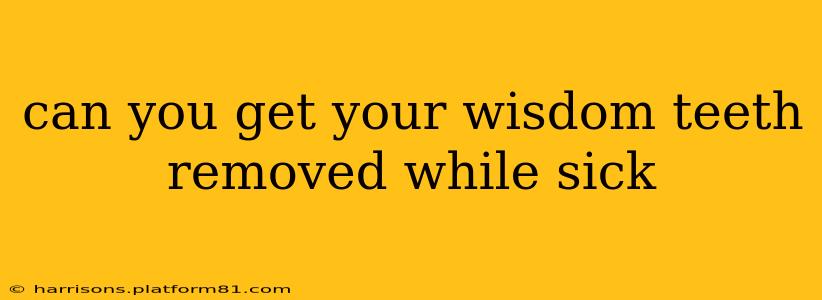Can You Get Your Wisdom Teeth Removed While Sick?
Getting your wisdom teeth removed is a significant oral surgery procedure. Your overall health plays a crucial role in how your body heals and recovers post-surgery. Therefore, the simple answer is: no, you generally shouldn't get your wisdom teeth removed while sick. Let's explore why.
What constitutes being "sick" enough to postpone wisdom teeth removal?
This isn't just about a mild cold. Postponing your procedure is recommended if you're experiencing:
-
Fever: A fever indicates your body is fighting an infection. This weakens your immune system, increasing the risk of infection at the surgical site and potentially slowing down healing.
-
Active Infection: Whether it's a respiratory infection, a sinus infection, or another type of infection, it's crucial to address this before undergoing surgery. The infection could spread during the procedure or interfere with healing.
-
Flu-like symptoms: These symptoms, including cough, body aches, and fatigue, weaken your system and make you more susceptible to complications.
-
Severe allergies: If you have severe allergies that could be exacerbated by medication used during or after the procedure, it's best to postpone.
-
Weakened immune system: Conditions like autoimmune disorders or treatments like chemotherapy compromise the immune system, increasing risks associated with surgery.
What happens if you proceed with wisdom teeth extraction while sick?
Attempting wisdom teeth removal while sick significantly increases the risk of:
-
Increased infection risk: A compromised immune system increases the chances of infection at the surgical site, potentially leading to complications like dry socket (alveolar osteitis), which is incredibly painful.
-
Slower healing: Your body's resources are focused on fighting illness, hindering the healing process of your surgical wounds. This can lead to prolonged discomfort and potential complications.
-
More intense post-operative pain: Recovery may be more difficult and painful than usual, requiring more medication and potentially prolonging your recovery time.
-
Medication complications: The medications used during and after surgery might interact negatively with medications you're already taking for your illness.
-
Increased risk of other complications: In extreme cases, a weakened immune system can increase the risk of more severe complications, although this is rare.
How long should you wait to get your wisdom teeth removed after being sick?
The waiting period depends on the severity of your illness. For a minor cold, you might wait a week or two until symptoms have completely subsided. However, more serious infections may require several weeks or even months of treatment before you're cleared for surgery. Always consult your oral surgeon. They will assess your condition and determine the appropriate waiting period based on your specific circumstances. They’ll also want to assess any medications you are taking.
What should you do if you're sick and scheduled for wisdom teeth removal?
Contact your oral surgeon immediately. Rescheduling is necessary to ensure your safety and a successful recovery. Early communication is vital in avoiding complications and making alternative arrangements. Do not simply show up for the procedure if you are unwell.
In conclusion, prioritizing your health is paramount before any surgical procedure, especially one as impactful as wisdom teeth removal. Always consult your oral surgeon to ensure you're in the best possible condition for a safe and successful surgery.
